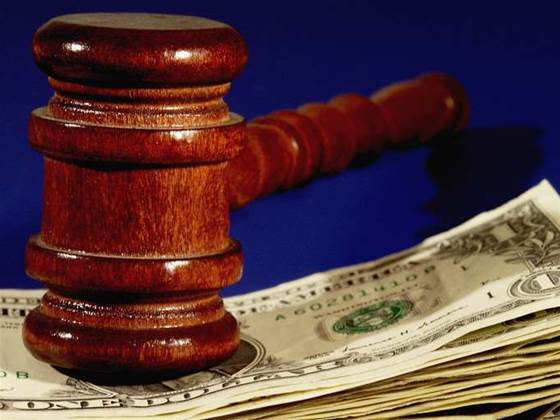
Had he pleaded guilty when the US offered him a plea bargain six years ago, he would have been back in England by now, and walking the streets as a free man.
But the terms of the bargain were always that if he denied the charges levelled by US prosecutors, they would come down hard on him. And now he must live in fear of the severest consequences.
Gary's solicitors, Kaim Todner, said in a statement handed out at the Lords today: "American officials involved in this case have stated that they want to see him 'fry'.".
This is the basis on which Gary will now make a last-ditch attempt at freedom by throwing himself at the mercy of the European Court of Human Rights.
The Lords said they would have given Gary his appeal if the US had made extreme threats of punishment in their plea bargaining. But they had no problem with the prosecutors' terms.
There was no mention of a threat that Gary would "fry" for his crimes in either the judgement presented by Lord Brown of Eaton-Under-Heywood today, nor in their hearing of the case last month. So there is at least a thread of hope for Gary to take to Brussels.
What the Lord's did consider was how Gary would probably have served only six to 12 months in a US jail and then no more than three years in the clink back home, had he but pleaded guilty. So why didn't he?
There is the small matter of his not agreeing with all the charges laid against him. Then Gary was also scared witless of even serving a short term in a US jail.
"I'm sitting up all night thinking about jail," Gary told The Guardian newspaper in 2005. "I'm having all these visions of, 'What you doing attacking our country, boy? Pick up that soap'," he said, describing how his legs would shake like jelly when he walked down the road.
The Lord's also considered what they called a threat of "homosexual rape" made by US prosecutors. In a test case they cited in the judgement (USA v Cobb [2001]), the US prosecutor had used such a threat to intimidate his Canadian quarry. "You are going to be the boyfriend of a very bad man if you wait out your extradition," the prosecutor had warned on television.
"That was understood by the court to mean that they would be subject to homosexual rape," said the Lords today. It was an intimidation, a violation of rights and an abuse of the legal process, the Canadian court said when it threw out the US extradition request. But again, there was no record of any such threat in Gary's case - only Gary's fear of being done up the Gary Glitter by some redneck muscle-boy.
Leaving the threat that he would "fry" aside, he only faced the possibility of "8-10 years, possibly longer" in jail; and that with no chance of repatriation he would see out some 95 per cent of the sentence in, most probably, a "high-security" rural prison.
In 2002, Gary was facing the prospect of 70 years and a US$1.75m fine. On the day he was indicted by the US District Court of Eastern Virginia, the US Department of Justice said in a statement: "McKinnon faces on each count a maximum sentence of 10 years of imprisonment and a US$250,000 fine."
The US subsequently said that if Gary did not plead guilty they would bill him US$400,000 to $1million for the cost in man hours to "conduct a damage assessment" and "restore the compromised computer systems" he had hacked (We have to wonder how much of this bill could be attributed to the time US techies spent plugging the holes Gary had exposed. Perhaps the hacker should be charging them for services rendered?).
An uncooperative Gary would also be billed for the organisational cost of computer systems being inaccessible while the damage assessments were being done. He allegedly hacked 97 of them in all, housed across numerous sites owned by NASA and various US armed forces.
Then there would be a charge for his alleged disruption to the Washington District defense computer network and the US Navy's Earle Weapons Station. And they wanted to bump the sentence up further for "endangering national security" and "substantial non-monetary harm", which might refer to the embarrassment the world's most powerful military suffered from having its computers hacked by a stoner with a handful of ten-penny software tools.
None of this constituted a threat extreme enough to be an abuse of justice, agreed Lord Scott of Foscote, Lord Phillips of Worth Matravers, Baroness Hale of Richmond and Lord Neuberger of Abbotsbury. The UK had no problem with such plea bargaining, they said.
Repatriation wasn't a right that Gary could claim under the Convention of Human Rights, as he had attempted. UK extradition law accommodated differences in foreign legal systems, they said. Gary's exploits would have been punished under UK law with a maximum sentence of life imprisonment anyway, they added.
And so the hapless hacker appears to have consigned much of his life to legal limbo and nightmares of shower-room violations. Over six years since he was caught blowing raspberries at the US military, he could wait years yet before he gets a judgement from Europe. Then if he is hoisted before a Virginian judge, the court will have to plough through 1 terrabyte of electronic evidence gathered by prosecutors.
Then what are his chances of getting off? It could be a while yet before we see a free Gary. µ
L'Inq BBC News

_(23).jpg&h=140&w=231&c=1&s=0)
_(28).jpg&h=140&w=231&c=1&s=0)

_(33).jpg&h=140&w=231&c=1&s=0)





 iTnews Executive Retreat - Security Leaders Edition
iTnews Executive Retreat - Security Leaders Edition
 iTnews Benchmark Awards 2026
iTnews Benchmark Awards 2026
 iTnews Cloud Covered Breakfast Summit
iTnews Cloud Covered Breakfast Summit
 The 2026 iAwards
The 2026 iAwards











_(1).jpg&h=140&w=231&c=1&s=0)



